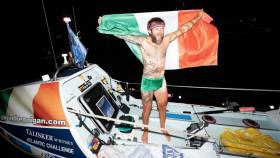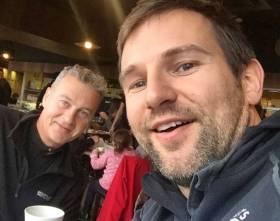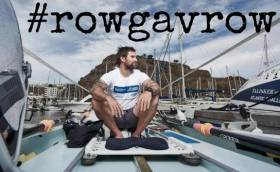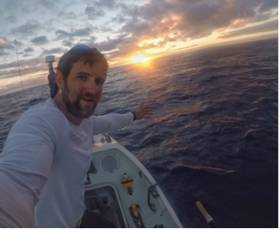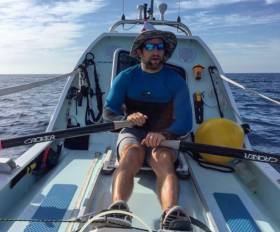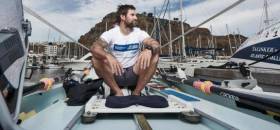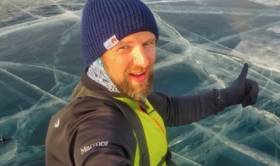Displaying items by tag: Hennigan
Hennigan Wins Battle And Takes Third in Atlantic Rowing Race
#Rowing: Gavan Hennigan traversed the finish line in the Talisker Whisky Atlantic Challenge tonight and marked himself out as a record breaker. The 35-year-old Galway man took 49 days to complete the row from La Gomera in the Canaries to Antigua in the West Indies. He became the fastest Irishman to row across the Atlantic, less than half the time taken by Sean McGowan (118 days) on this route in 2010; he also beat the record set by Irish-born Briton Tom McClean, who rowed across the North Atlantic in 55 days in 1987.
Hennigan (35) won an exciting battle with the three-man American Oarsmen to take third of the 12 boats in the race. The American crew pushed hard over the final week and almost caught the Irishman. Though they covered impressive distances each day, Hennigan matched and even outpaced them.
The crew which won, Latitude 35, set a new world record. It had a four-man crew, as did the second boat to finish, Row for James.
Taking their places behind Hennigan are a four, three trios, two pairs and three solos.
Hennigan is not the fastest man to row solo across the Atlantic, as stated in one media outlet. In 2013, Charlie Pitcher became the fastest solo rower to cross the Atlantic in an open class boat: he crossed from La Gomera to Barbados in 35 days and 33 minutes. The statistics are available on oceanrowing.com.
What a wonderful achievement by Gavan Hennigan. When he said he thought he could complete the race in 50 days, I thought it was hugely ambitious for a first-timer. And then he beat it! Amazing.
You might be able to confirm something for me. Is he now the fastest solo rower over the La Gomera to Antigua course? And do you know where he ranks in the list of solo rowers to cross the Atlantic?
He told me you were a key part of the team he had ‘on land’. Well done to all!
Yours,
Liam Gorman, Rowing Correspondent, The Irish Times
00353 (0)86 8051830
Atlantic Rower Hennigan Sets Up Exciting Finish
#Rowing: After 5,000 kilometres of rowing, Gavan Hennigan is in a race to the line in the Talisker Whisky Atlantic Challenge. The three men of American Oarsmen are finishing fast, hoping to take third from the Irishman in the row from the Canary Islands to the West Indies. The American boat has been hitting remarkable numbers (93 nautical miles per day/172 km) but Hennigan retains a slight lead as the crews dash to the finish in English Harbour in Antigua. Both crews should finish late on Wednesday night or early on Thursday.
The race started on December 14th in the Canary Islands. Hennigan (35) is set for a new Irish record for a solo oarsman rowing across an ocean. The crew which won, Latitude 35, set a new world record. It had a four-man crew, as did the second boat to finish, Row for James.
American Oarsmen Cutting Into Hennigan's Lead
#Rowing: Solo rower Gavan Hennigan is in a battle to hold off the three-man boat American Oarsmen in the Talisker Whisky Atlantic Challenge. Two boats have finished the race from the Canaries to Antigua and Hennigan leads the nine boats still rowing. The winds have not favoured the Galway man and American Oarsmen, who can row 24 hours a day, have closed on him. They are just a day behind and look a good bet to overtake him to take third. Hennigan, who cannot man the oars on the same round-the-clock basis, regained some momentum on Tuesday.
“The American trio are pushing me hard,” Hennigan said. “They were tipped to win [the race] but had a lot of problems early on and now they are posting some crazy 24-hour mileage. Anyway, I am one man here and giving it my all and what will be will be. I’m happy to be here and want to enjoy the last 12 days of this epic adventure.”
Irish Atlantic Oarsman Third in Twelve-Boat Race
#Rowing: Gavan Hennigan has taken over in third in the Atlantic Challenge rowing race. As the race from Europe to the West Indies enters its 10th day, team SouloGav was edging ahead of American Oarsmen, a trio. Remarkably, the Irish solo oarsman now leads all but two boats in the 12-boat fleet. The two leading boats are both fours: Latitude 35, an American boat, and Row For James from Britain. Row for James is named after James Wentworth-Stanley, who took his own life at 21. His brother, Harry leads the crew, which hopes to raise awareness of depression and suicide in young men. Gavan Hennigan is raising money for Cancer Care West and Jigsaw Galway, which supports the mental health and wellbeing of young people in Galway.
Solo Rower Hennigan Showing the Way in Atlantic Race
#Rowing: A week into his Atlantic crossing, Gavan Hennigan continues to do exceptionally well. The Galway man is the fastest solo rower in the Talisker Whisky Atlantic Challenge from La Gomera to Antigua. More impressively, he is fourth overall of the 12 boats. Hennigan is farther into the race than a four, two trios and two pairs, as well as the other three solo rowers. At the head of the field, two fours are fighting it out: Latitude 35 from America and Row for James from Britain. Just ahead of Hennigan, whose team is called Soulo Gav, is the trio, American Oarsmen. Hennigan has been warned that there may be difficult weather ahead.
Good Start by Atlantic Rower Hennigan
#Rowing: Gavan Hennigan has had an excellent start to the Talisker Whisky Atlantic Challenge. The Galway oarsman, rowing as Soulo Gav, is running fifth of the 12 boats and is leading the three solo boats. “It's been a hard few days adjusting to ocean life but getting easier,” he said in a tweet today.
Hennigan and the other rowers left La Gomera in the Canary Islands on Wednesday. He had rowed 200 kilometres (108 nautical miles) by 5pm Irish time on Friday.
Irish Solo Oarsman Braves Atlantic
#Rowing: Gavan Hennigan has set off to row the Atlantic as part of the Talisker Whisky Atlantic Challenge. The Galway man, competing as Soulo Gav, is one of three solo rowers (two men and a woman) taking part in the race from La Gomera in the Canary Islands to Antigua. The test, over approximately 4,700 kilometres, started on Wednesday morning.
Hennigan is a seasoned adventurer. He has taken part in ultra events across the world. He is supporting two charities as part of the Atlantic Challenge: Cancer Care West and Jigsaw Galway, which supports the mental health and wellbeing of people aged 15 to 25 in the western city. Hennigan, who is now in his thirties, had problems with both drug and alcohol addiction as a youth.



























